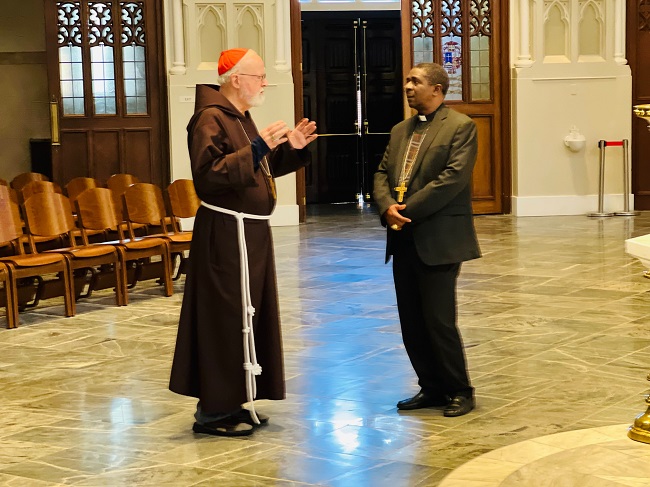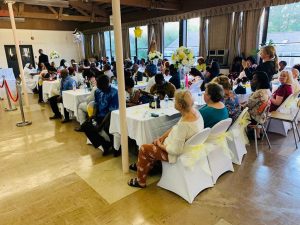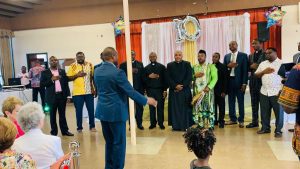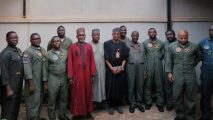26, August 2019
Southern Cameroons Crisis: Prominent kidnapped Catholic bishop released 0
A prominent Catholic bishop in Cameroon was released late Saturday after being kidnapped in the country’s volatile English-speaking Northwest region, according to church officials.
“Bishop George Nkuo of Kumbo Diocese has been released by his captors. He is back in the parish and in good health,” the officials said in a statement.
Armed separatists claimed responsibility for kidnapping the bishop, claiming that they “wanted him to pray and bless us.”
The abduction came barely a week after two Catholic priests were kidnapped in the region.
Kidnapping of priests has become widespread in the region since an armed conflict started in 2017.
Cameroon’s Northwest and Southwest regions are English-speaking, while the rest of about 80 percent of the country is French-speaking. Separatists in the two English-speaking regions have been fighting government forces in an effort to establish a separate state.
About 530,000 people have been displaced internally and hundreds killed by the conflict, according to the United Nations.
Source: Xinhuanet






























5, September 2019
Southern Cameroons: Bible translator’s wife in recovery after hand cut off, husband killed 0
The wife of a Bible translator, who was killed by suspected Fulani herdsmen in Cameroon, is in recovery after having her hand cut off, a ministry source told The Christian Post.
Efi Tembon, who operates a humanitarian ministry called Oasis Network for Community Transformation, told CP on Tuesday that Eveline Fung, the wife of slain Bible translator Angus Fung, is in stable condition and is speaking again after an attack on her home village on Aug. 25.
“She is still in the hospital but she’s improving,” Tembon said. “Her hand is gone but she will be OK.”
Fung was said to have received a blood transfusion at a local hospital.
“Emotionally, it is still a very traumatizing situation for her,” he added. “It is very, very traumatizing and she will need trauma healing.”
Tembon reported last week that the Fungs were among those victimized by a Fulani attack believed to have been encouraged by government actors in the town of Wum in Cameroon’s violence-ridden Anglophone region.
Tembon, who has done ministry work in Wum in the past, said youth from the Fulani herding community are being armed and ordered to attack farming villagers that support separatist rebels.
The separatist rebels are fighting for freedom as those in the English-speaking region feel underrepresented in the majority French-speaking central government.
Angus Fung, who was in his 60s, was a leader in the community and played a vital role in the New Testament translation into the Aghem language, a project completed in 2016. Tembon said Fung was hacked to death by a man wielding a machete.
“[H]e was a huge part of the literacy work because their language had never been written before,” Tembon said. “So he was the one coordinating it and teaching the language. So many people now can read and write the language as a result of Angus’ work.”
In addition to Fung, Tembon said that a couple who had fled their home after military attacks on their village and were being sheltered in the Fung home in Wum were also killed in the Aug. 25 attack. While Tembon initially reported that seven were killed in the Wum attack, he told CP that the death toll in the Wum attack is six.
“They went into houses and pulled out the people,” he said last week. “They attacked in the night and nobody was expecting. They just went into the home, pulled them out and slaughtered them.”
Tembon explained that he doesn’t think that Eveline Fung, who has five children ranging in age from 3 to 22, will be able to return to the home because of the trauma she suffered.
His organization, he noted, sent money to help pay for medical costs and food. Additionally, Tembon is trying to organize support so Fung can flee the country, possibly to Nigeria.
“It will be very traumatizing for her to go back to her home where she was butchered and her husband was killed along with all those people,” he said. “We are thinking about what to do.”
Since last year, according to Tembon, at least 23 people in Wum have been killed in Fulani attacks.
Since the civil conflict began in 2016, estimates suggest that at least 2,000 people have been killed, though Tembon predicts that the number could likely be closer to 7,000.
Oasis for Community Transformation has also helped others escape the violence in Cameroon, including the wife of Pastor Keloh Elijah, who was killed earlier this year by the military in the Mfumte area.
“Not only in Wum but in many other areas, the attacks continue and they continue to kill people,” he said. “Attacks take place every day. There is not a day that goes by without at least five people being killed. Sometimes when the local fighters attack the military, there is a shootout. And sometimes, [innocent] people get killed.”
“Some have been picked up by the military and shot. And others have been killed by bullets during a shootout.”
Since the Aug. 25 attack in Wum, Tembon said he has heard of violence occurring in towns like Kumba, and Bamenda and Santa.
Since the beginning of the conflict, tens of thousands have fled Cameroon into neighboring countries like Nigeria and Ghana while hundreds of thousands have been internally displaced.
Tembon, a Cameroon native who can no longer go back to the country after speaking to U.S. Congress in 2018 about the military’s violence against citizens, is now based in the U.S. He has engaged in advocacy efforts, speaking to the U.S. State Department and Congress to raise awareness of the situation.
He has also advocated in Canada and the United Kingdom to pressure the international community to be proactive in mediating the conflict in Cameroon.
Tembon said he is arranging a meeting between representatives from the separatist groups and staff from the U.S. Senate Foreign Relations Committee that will take place in mid-September on Capitol Hill. He is still waiting to hear if any members of the Senate will be present for the meeting.
Tembon is also organizing a meeting between the separatist representatives and the State Department.
“There is an initiative that started in Switzerland,” he said. “Switzerland offered to do mediation but they are not very well trusted. So some of the leaders wanted to have a United Nations mandate to [allow Switzerland] to mediate the conflict so that it will be transparent.”
“Without mediation, the war will continue and people will continue to die and be in pain. Because the U.S. is a key stakeholder, the U.S. can use its influence to ask that a U.N. mandate be given to Switzerland to be a mediator.”
In July, Democrat Sen. Ben Cardin of Maryland led a bipartisan group of senators in introducing a resolution calling on the Cameroon government and armed separatist groups to “respect the human rights of all Cameroonian citizens, to end all violence, and to pursue an inclusive dialogue to resolve the conflict in the Northwest and Southwest regions.”
“We have an obligation to call out instances of human rights violations wherever they happen,” Cardin said in a statement.
“The situation in Cameroon is untenable. Our resolution encourages all parties to the conflict to uphold the rule of law and prioritize respect for human rights for all Cameroonians — including political, religious, independent media and civil society leaders — over his desire to hold onto power by any means necessary.”
Tembon would like to see “addressing the root causes of the conflict” added to the Senate resolution. “If the root causes are not resolved, then the conflict will continue,” he warned. “Any mediation should address the root causes of the conflict.”
Sourc: The Christian Post